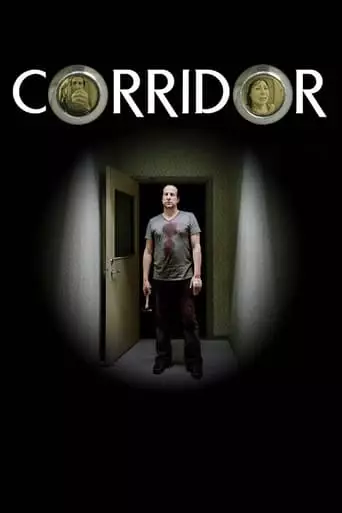Lonely medical student Frank is pleased with his flat, a quiet place to focus on his coming exams. But when he meets the girl upstairs, the intrusive Lotte, he realizes there is something wrong with the place. Each time he leaves his apartment, Frank is scared… the talkative concierge, the annoying child, the love-sick Lotte, her brutal ex-boyfriend and above all, her new jealous boyfriend, the scary Micke, they all seem to be Frank’s enemies.
Corridor (original title: Isolerad) is a Swedish psychological thriller directed by Johan Lundborg and Johan Storm. This tense and claustrophobic film delves into themes of isolation, paranoia, and the fragility of human connection. With its minimalist setting and intense atmosphere, Corridor offers a unique cinematic experience that leaves viewers both unsettled and contemplative.
Plot Overview
The film centers on Frank, a reclusive medical student living in a gloomy apartment building. Frank’s life is monotonous and dominated by his studies, which he uses as an excuse to avoid social interactions. His introverted existence is disrupted when he meets his neighbor Lotte, a lively young woman who is the complete opposite of him.
Lotte is involved in an abusive relationship with Micke, her violent and unstable boyfriend. She seeks refuge in Frank’s apartment, pleading for his help and companionship. Despite his initial reluctance, Frank becomes entangled in her troubled life, leading to a series of unsettling events.
As Frank becomes more involved, paranoia sets in. The walls of his apartment and the corridors of the building seem to close in on him. He struggles to discern whether the dangers he perceives are real or the product of his imagination. The film builds to a chilling climax, forcing Frank to confront his fears and the consequences of his choices.
Analysis
Corridor is a masterclass in tension and psychological unease. The film’s strength lies in its ability to blur the line between reality and paranoia, immersing viewers in Frank’s perspective.
- Character Study:
Frank serves as a compelling protagonist. His introversion and anxiety are relatable to anyone who has ever felt overwhelmed by the demands of modern life. The film explores his psychological unraveling, offering a nuanced portrayal of how isolation can exacerbate mental health struggles.
- Claustrophobic Atmosphere:
The apartment building is as much a character as the people within it. Its dimly lit corridors and oppressive architecture heighten the sense of entrapment. The cinematography uses tight framing and muted colors to emphasize the suffocating environment.
- Ambiguity and Suspense:
One of the film’s most effective techniques is its ambiguity. Viewers are kept guessing about the true nature of the threats Frank faces. Is Micke truly as dangerous as he seems? Is Lotte manipulating Frank? Or is Frank’s own mind the real antagonist? This uncertainty creates a pervasive sense of dread.
- Social Commentary:
Corridor subtly critiques the alienation inherent in urban life. Frank’s isolation is not just self-imposed but also a reflection of a society that prioritizes individual achievement over communal connection.
Themes
- Isolation:
Frank’s solitude is the heart of the film. His reluctance to engage with others ultimately leaves him vulnerable to both external threats and his own spiraling thoughts.
- Paranoia:
The film explores how fear and mistrust can distort reality. Frank’s inability to trust others—or himself—drives the narrative forward.
- The Burden of Responsibility:
Frank’s dilemma revolves around his responsibility toward Lotte. Helping her comes with significant risks, but ignoring her plight weighs heavily on his conscience.
- Moral Ambiguity:
The characters’ motives are rarely clear-cut, challenging viewers to question their own assumptions about right and wrong.
- Urban Alienation:
The film depicts the loneliness of city life, where neighbors remain strangers despite living in close proximity.
10 Reasons to Watch Corridor
- Psychological Depth: The film offers a fascinating exploration of human psychology, particularly the effects of isolation and anxiety.
- Tense Atmosphere: From start to finish, Corridor keeps viewers on edge with its expertly crafted suspense.
- Relatable Themes: The film’s exploration of loneliness and moral dilemmas resonates universally.
- Minimalist Storytelling: The pared-down narrative and setting allow for a focus on character and atmosphere.
- Strong Performances: Emil Johnsen (Frank) and Ylva Gallon (Lotte) deliver nuanced portrayals that anchor the film.
- Ambiguity: The film’s refusal to provide easy answers makes it a thought-provoking experience.
- Cinematography: The use of lighting, framing, and color creates a visually striking, claustrophobic world.
- Cultural Perspective: As a Swedish film, Corridor offers insights into Scandinavian cinema and storytelling.
- Short Runtime: At just 80 minutes, the film is a compact yet impactful experience.
- Unforgettable Ending: The climax lingers in the mind, encouraging reflection long after the credits roll.
How Will This Film Make You Feel?
Watching Corridor is an emotional rollercoaster. It is likely to evoke:
- Tension and Anxiety: The film’s suspenseful tone will keep you on edge, mirroring Frank’s own unease.
- Empathy: Frank’s struggles with loneliness and fear are deeply human, encouraging viewers to reflect on their own vulnerabilities.
- Discomfort: The claustrophobic setting and moral dilemmas may leave you feeling unsettled.
- Contemplation: The film’s ambiguous narrative invites interpretation, sparking discussions about morality, fear, and human connection.
- Relief and Catharsis: While the film is intense, its conclusion provides a release, though not necessarily resolution.
Corridor is a haunting, introspective thriller that offers more than just suspense. Its exploration of human frailty and the complexities of modern life make it a must-watch for fans of psychological cinema. Whether you’re drawn to its atmospheric tension or its thought-provoking themes, this film promises an experience that will stay with you long after the screen goes dark.

